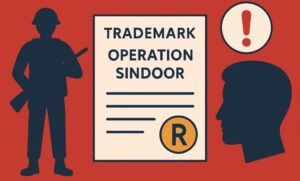A word, name, symbol, or device, which is able to identify or distinguish goods or services from others can come under the umbrella of Trademark. In other terms, Trademarks are basically almost anything that distinguishes the products and/or services from others. Even, the source of goods is indicated by Trademarks – which at times are even unknown to the consumer. The rationale for granting legal protection for Trademarks is based on the fact that they are a type of intellectual property right which demonstrate the standard and quality of products and/or services – mainly based on goodwill and reputation, and also at the same time provides legal protection to the brand from fraud and counterfeiting products and/or services.
With a constant and long duration of usage of the Trademark, the marks gain a reputation of its own with the products and/or services that it is associated with. The reputation can be such that it is confined to a particular region, or is something which has gained popularity across borders. The popularity of Trademarks to percolate across the borders is more possible because of the advent of technology – which helps spread information locally as well as globally in no-time.
Now, Trademark being one of the wings of Intellectual Property Law, and Law being one which evolves based on preceding and foundations as laid by the Court, Trademark law is no exception. Out of various theories in Trademark Law as is established by the court, ‘Trans-border reputation’ or ‘Cross-border reputation’ of Trademark is the theory which was established by the Courts of Indian in the celebrated case of N R Dongre v. Whirlpool Corporation, 1996 (16) PTC 583.
Table of Contents
ToggleFactual Background of the case:
The Whirlpool Corporation was the original and prior user of the trademark ‘whirlpool’ since 1937, which was associated with electrical goods, including washing machines. They got the trademark registered in India in 1956 which was renewed regularly, however, in the year 1977 they failed to do the renewal – and the registration expired. Subsequently, Whirlpool Corporation and TVS Whirlpool, a company incorporated in India entered into a joint venture in the year 1987 to sell machines with the said trademark. Prior to this, the machines were sold to the US embassy in India bearing the mark of whirlpool.
Meanwhile, Mr. N.R Dongre filed for registration of trademark ‘Whirlpool’ in the year 1986 – which, when published, was opposed by Whirlpool Corporation – the opposition was initially dismissed by Assistant registrar on basis of lack of reputation and non-usage of the trademark ‘whirlpool’ in India.
Subsequent proceedings:
TVS Whirlpool filed for an appeal against the order of the Assistant Registrar before the Delhi High Court, wherein, Single Judge Bench held the case in favour of TVS Whirlpool Ltd. The court stated, that TVS Whirlpool Ltd had been selling their products to the U.S embassy and ATO in India even before Mr. N.R Dongre came into the market. Additionally, TVS Whirlpool Ltd had given advertisements in various international magazines about the products under the trademark and name ‘Whirlpool’ – which were being circulated in India. Thus, a temporary injunction was granted against Mr. N.R Dongre and Co.
Subsequent to this, Mr. N.R Dongre and Co. filed an appeal before the division bench of the High Court and the decision of the Single Judge bench was upheld. Same was the case when a Special Leave Petition was filed before the Supreme Court under Article 136 of the Indian Constitution.
Courts, in this case recognized the concept of ‘Trans-Border Reputation’ and established that in cases wherein one party has sufficient worldwide reputation in connection with a Trademark, they are entitled to seek protection in respect of the same irrespective of its market base or registration.
Further, in the case of Toyota Jidosha Kabushiki Kaisha v. M/S Prius Auto Industries Limited, 2018 (73) PTC 1, the Supreme court held that to take the blanket of ‘Trans-Border Reputation’, one needs to prove that their mark has acquired substantial trans-border reputation (or goodwill) in India even when it has already acquired a good proportion of reputation in any other jurisdiction.
Frequently Asked Questions
What is the reputation of a trademark?
Trademark is one of those Intellectual Property Rights whereby registration is not a mandate and, usage of the mark over time along with the associated goodwill, if proved, a mark owner can claim the mark to be exclusively his mark. Passing Off is the protection of the goodwill of traders about to with concerning goods and services. Now, “goodwill” is what comes with the reputation of the mark – and that is what provides inherent values to the trademark. Generally, the goodwill or reputation of a trademark is measured and valued when a company as a whole is bought or sold and the valuation associated with the goodwill is measured as the difference between the company purchase price and the value of the company’s tangible assets.
What is cross border reputation?
Cross-border or Trans-border reputation of a trademark comes into play when the mark in question crosses physical borders of territory or geography and gains the reputation of the goods or products associated with it in large. The doctrine of this Cross-border or Trans-border reputation was established in the case of N R Dongre v. Whirlpool Corporation, 1996 (16) PTC 583 whereby Supreme Court of India laid the foundation of the “Trans-Border Reputation”. The court held, even though Whirlpool was not selling in India, they can claim the benefit of transborder reputation irrespective of its market base or registration in India in scenarios when the mark has gotten wide acknowledgement and reputation across borders.
Cross-border or Trans-border reputation is different from ‘well-known trademarks’ in the sense, that Cross-border or Trans-border reputation is something which is not limited to any particular geographical territory or any specific provisions of law, while the well-known trademark can be understood as a trademark which has gained wide popularity across the country and moreover, which has reached beyond the limits of the goods and services. Further, well-known trademark is defined in Section 2 (1)(zg) of Indian Trade Marks Act 1999, while Cross-border or Trans-border reputation draws its meaning from case law precedence.
Why is reputation important for trademarks?
Reputation of a trademark is its indication of the fact it has a goodwill associated with the goods or services that it is linked to. Now, in cases whereby the reputation is not limited or confined to a particular border or territory, cross border or trans-border reputation comes into picture. In cases whereby a trademark has acquired cross border or trans-border reputation, the legal owner of that trademark can claim the protection in the business – which can be worldwide.
What is Section 35 of the trademark Act?
Section 35 of Indian Trade Marks Act 1999 states: ‘Nothing in this Act shall entitle the proprietor or a registered user of a registered trade mark to interface with any bonafied use by a person of his own name or that of his place of business, or of the name, or of the name of the place of business, of any of his predecessors in business, or the use by any person of any bona fide description of the character or quality of his goods or services’.
This section indicates that a proprietor/user of registered trademark cannot interfere with a person or any of its predecessors with bonafied use of his name or place of business or both or use by any person of bonafied description of character or quality of goods. This section is more so applicable in cases whereby the mark isn’t applied for registration.





